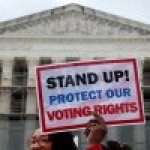
Presidents can be elected twice. Trump could try end runs around that, experts say
March 31, 2025
‘Real Danger in This Moment’: 1,900 Scientists Issue SOS Over Trump’s Attack | Common Dreams
March 31, 2025
A weak Left, struggling to navigate a hostile media environment, must sometimes rely on proxies to transmit its ideas. It often falls to fellow travelers with more establishment credibility to advance dissenting positions in mainstream outlets. One such figure is the financier-turned-YouTuber Gary Stevenson, whose memoir, The Trading Game — which has now spent seven weeks at the top of the UK bestseller list — describes his ascent from working-class East London to the foreign exchange desk at Citibank, followed by his growing disillusionment with high finance. The book’s success has raised Stevenson’s profile as a campaigner against inequality, and he posts regular video explainers about the death spiral of the British economy and the likelihood of mass immiseration. It has also allowed him to drum up support for his proposed solution: a wealth tax, which he presents as “not a left or right issue” but a matter of simple common sense.
Though The Trading Game is billed as a confession, the tone of the book is more swaggering than penitential. Stevenson writes that he was “born to be a trader,” recalling a hard-knock childhood hustling candy, newspapers, and eventually drugs. His math skills earn him a place at the London School of Economics, where he coasts through his studies and becomes a campus celebrity. When he hears that Citibank is organizing a competition for students, with the victor promised an internship, he knows immediately that he will win. Soon enough he is in LA partying with Carmen Electra and Jay-Z. His bosses are fighting with each other to take him under their wing. He is given an unprecedented £395,000 bonus at the age of twenty-two.
How did he do it? Stevenson recalls that it was “easy” to make a killing off lending dollars in the wake of the 2008 financial crash, when demand for the world currency was soaring. But his singular intellect and courage “may have played their parts as well,” he reckons, since no one else had ever had “the nerve . . . to put on such big trades at such a young age.” As he puts it:
When a trade kicks my arse, I’m gonna do more. If it kicks my arse more I will do more again. I don’t know why I’m like that. Maybe because fuck you that’s why. All I know is if a trade’s gonna fuck me then I’m gonna fuck the trade back and I’ll keep fucking it until I win.
Awed by Stevenson’s abilities, Citibank sends him on a globe-trotting tour in 2011. He receives that year’s £420,000 bonus while lounging “on the eighteenth floor of a huge hotel in Singapore, overlooking the Marina Bay.” Yet upon returning to London, he heeds the advice of a coworker who tells him that if he really wants to understand the economic forecast he should “take a walk down the high street. See all the fucking shops closed down. See the fucking homeless people under the fuckin bridge.”
That’s when it hits him: the economy isn’t some abstract system — it’s “people, it’s houses, it’s businesses, it’s loans.” And inequality, he begins to realize, is like a terminal cancer steadily eating away at the foundations of any real recovery — even as his fellow traders continue betting that one is coming. There is only one logical response to this insight, he decides, and that is to “buy green Eurodollars.”
By wagering that the economy will continue to falter and interest rates will stay at zero, Stevenson supposedly becomes “Citibank’s most profitable trader, in the whole world.” Interns crowd around him to learn his secrets. Brokers take him out for lavish lunches. Headhunters call him constantly. He is nicknamed “The Legend.” But he doesn’t “give a shit” about his reputation, so he tells us, and increasingly finds this lifestyle “fucking boring. Boring, boring, boring, boring, boring.”
He begins to despise his coked-up colleagues who only landed their positions because of family privilege. He starts waking up with cold sweats. One night while walking home he rips the side-view mirror off a car “for absolutely no reason.” He is transferred to the office in Tokyo, where he finds the job maddeningly simple and spends hours every day sleeping at his desk. Maybe he doesn’t want to be a trader after all.
But he does want his next eye-watering bonus — which he stands to lose if he quits. So he tries to exploit a company policy that lets traders keep their deferred stock if they leave to work for a charity. This initiates a torturous back-and-forth between Stevenson and his bosses over whether he can keep the money. He treats us to a few selections from his inner monologue at the time: “Fuck them. Fuck them. Fuck them. Fuck them”; “Fuck you, I thought, you’re a fucking rat. A fucking rat, you are, just like me”; “I wasn’t leaving without the fucking cash.”
His girlfriend suggests that he forget about this pointless struggle and simply walk away with the millions he already has. He breaks up with her the next day. His life turns to “ashes and bone.”
“What would it mean if I couldn’t get out? What would I do? . . . What would I turn into? What would I become?”
After a few months, Citi relents. Stevenson gets his payout and strides off into the sunset — augmenting his massive wealth and taking a job at a charity focused on inequality.
Since then, Stevenson has built a career as, in his words, “one of the best-paid economists in the entire fucking world.” His videos get millions of views. The Trading Game sold for six figures and is soon to be adapted for the screen. The reasons for its acclaim are not hard to see. Reviewers praise its “intimate window onto a world that few of us will ever experience,” its “incredible stories from the trading room floor,” its “account of a young man’s adventures in the financial markets.” The book is predictably credited for its “moral compass,” but its popular appeal lies mostly in these lurid B-movie depictions of city life — which for Stevenson are clearly an object of lingering pride. We are invited to marvel at his exploits more than we are asked to reflect critically on them. Occasional asides about poverty are simply a moral supplement that allows us to continue enjoying the spectacle of decadence.
For all of Stevensons’s talk about the “real” economy, there is next to nothing in the book about the actual impact of Citibank’s practices: predatory lending, mass foreclosures, lobbying against corporate taxes, investing in fossil fuels, financing the arms industry. That’s because Stevenson goes out of his way to keep the focus on himself.
His revelation that the economy is too unequal to recover from the crash is not a moment of political awakening; it is merely the prompt for yet another daring and ingenious moneymaking scheme. His disenchantment with finance is not motivated by any ethical qualms; it is a result of being bored, finding it too easy, needing larger outlets for his intelligence. His struggle against the bank — which devolves into a series of petty email exchanges and bureaucratic squabbles, which Stevenson relays with acute self-pity — is ultimately about whether or not he will be allowed to take home a few more million. All roads lead back to Gary.
The Trading Game isn’t really about the relationship between the gilded world of finance and the crumbling world outside. It is about Stevenson’s inner world, with all its hang-ups and grudges and self-glorifications (the Financial Times has effectively dismantled his claims about his past success, citing former colleagues who noted that he had “delusions of grandeur”). This may be standard fare for a bestselling memoir. Whether it is enough to support an alternative way of thinking about the economy is another question.
Stevenson is now among the country’s most ubiquitous media commentators, and his advocacy for wealth taxes — via a group called Patriotic Millionaires — has come at an auspicious moment, when the Labour government is insisting on the need for more austerity. But while this single-issue focus may be admirable on its own terms, it mirrors the myopia of The Trading Game. The core insight that defined his finance career — that people are too poor — has simply been repackaged into a policy prescription: people should be less poor. His imaginative horizon remains limited to his own experience.
Questions of ownership, regulation, investment, services, working conditions, democracy — all are treated as inconsequential for the economy. “Inequality,” by which he means wealth inequality, is “the only thing that matters.” Stevenson is no longer a trader, but he is just as fixated on money as the be-all and end-all.
Nor does Stevenson offer a clear plan to realize his redistributive goals. When in doubt, he tends to fall back on the rhetorical power of repetition. “Tell your friends,” he urges, “tell your families. Build the movement. . . .We build, we build, we build, we build, and then we go together, and we win.” It is not the most detailed theory of change. And its emphasis on persuasion — getting as many people as possible to agree that wealth taxes are a good idea — seems particularly strange in a context where three-quarters of Britons already support this proposal.
Explaining why that support hasn’t translated into policy — and how it might — would require confronting some of those “left or right issues” that are beyond Stevenson’s reach.
Admittedly, the British left needs all the help it can get. If Stevenson’s activism makes it easier for socialists to mount a challenge to the government, then it should not be dismissed. But we must be clear-eyed about the conditions that have enabled his discourse on inequality to get a hearing in the legacy media. Part of it is his knack for putting himself — his highly monetizable boy-made-good backstory — at the center of his message. Part of it is his narrow emphasis on wealth taxes, presented without a broader program or strategy. This makes the demand easier to neutralize — reframed not as a challenged to power but simply a “good idea.”
These are among the fatal compromises that allow progressive arguments to circulate in an inhospitable climate. The Left should be wary of such trade-offs.
Great Job Oliver Eagleton & the Team @ Jacobin Source link for sharing this story.







